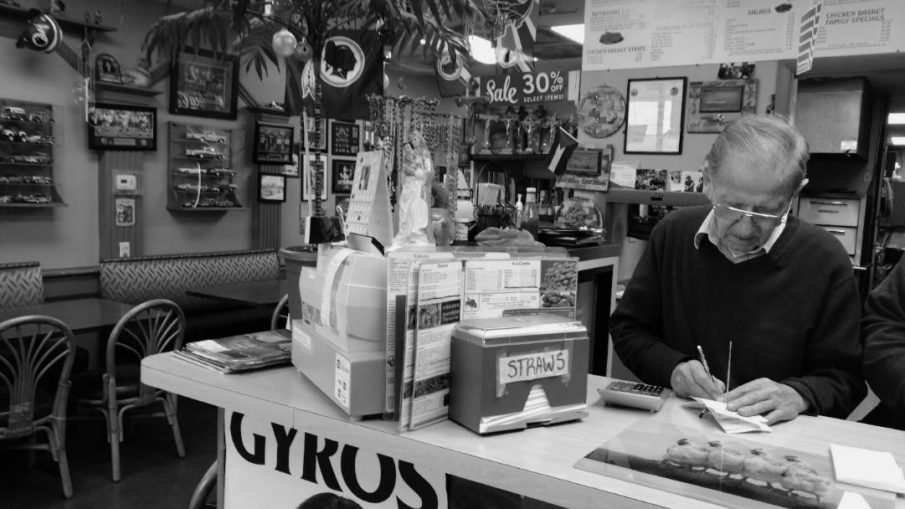Catholics to the left, Redskins fans to the right.
Chicken Basket, a small, family-owned restaurant, is divided in this manner almost perfectly down the middle. The seating area is to the left where the walls are decorated with 80s Redskins memorabilia that border on Americana. The photographs of popular Redskins players serve as tribute to the team’s past record, and are for sale. Each jersey and poster is put on display with great care and sports a small, colorful sticker naming its price.
The opposite side of the establishment sends quite a different message. Rosaries and crucifixes line the paying counter and connecting wall. A large display alerts customers that these items are also for sale – a sign boasts, “30 percent off select items!” A lone frame suddenly disrupts the religious imagery – a single picture of Peter O’Toole in Lawrence of Arabia merits its own special place on the wall. Finally, at the counter there are worn photographs of the owners’ family, proudly displayed where customers will see and enjoy them.
Tony and Jihan Hishmeh are the proud owners of Chicken Basket on Thomas Johnson Drive, and are the playmakers behind this display. Like the busy walls of their small restaurant, they too have a story to tell.
The Hishmeh’s bought the restaurant while they still lived in Palestine. They began their business venture on Nov. 15, 1987 — the day after they arrived in America. That was the year the Redskins won the Super Bowl against the Indianapolis Colts, and Tony admits they were “hooked” by the ‘Skins when they arrived. This November will mark their 30th anniversary as successful owners of Chicken Basket, but it hasn’t always been easy.
“It was hard to get established,” Tony said slowly, looking pensively through large, wire-rimmed glasses around the one-room restaurant. A regular customer sits in a booth against the far wall, and a ceiling fan lazily circulates the warm air.
Before coming to the United States, Tony spent two semesters at the University of Louisville in Kentucky, where he has family. He says his experience there made the move easier for him. Jihan, his wife, never visited America prior to their arrival.
Neither Tony nor Jihan like certain aspects of American culture, such as what Tony calls a lack of “family respect.” But for Jihan, the differences run deeper than just cultural values. At the mention of Palestine, a wry smile crosses her face and she speaks with sudden subtlety.
“It’s the Holy Land,” she says, almost in a whisper, as if confiding precious information. The skin around her eyes wrinkles in affection, and the simple statement becomes a unique insight into the life of Jihan Hishmeh. Although America offers up new opportunities for her and her family, the origin of her religion lies deeply rooted in Palestine.
Although Palestine and America are vastly different, the Hishmeh’s aren’t very different from any other small business owners. They work hard, and treat the people they serve with respect.
Tony Hishmeh does that by taking special care to buy the best quality ingredients he can. He also points out that although he could buy a case of cheap chicken strips for just $20, he pays $56 instead for a better quality of material.
“The customers know the difference,” he says slowly and with a smile, “If I don’t eat the food I’m gonna give you, I don’t give it to you.”
This old-world mentality lends a casual, sit-and-stay-awhile charm to the small space. Time seems to stop somewhere between the first Redskins poster and the last crucifix, where Christ looks down on the scene approvingly. The popularity of their food and reliable flow of regular customers illustrates with clarity that the Hishmehs have carved themselves a place in the community.
Tony looks up from the bill he’s adding and leans comfortably against the counter, contentedly surveying the fruit of 30 years’ worth of labor and determination. The result of 30 years can fit into a single room, a single kitchen, a single cash register. The accumulation of memorabilia is more so an indicator of the age of the business than any other aspect in the shop.
“I think we did the right thing to start here,” he said with a satisfied nod, and returns to business as usual.

